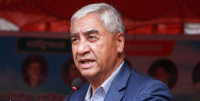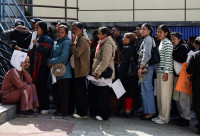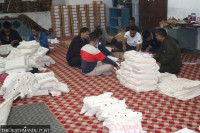National
Teachers’ groups, Minister Pun on a collision course over move to ‘depoliticise’ education sector
In a recent statement, Education Minister Mahabir Pun had announced he would take action against politically affiliated teachers at schools and universities.
Post Report
The Ministry of Education, Science and Technology and the teachers’ associations are at loggerheads following the former’s decision to take action against politically affiliated school and university teachers and other employees.
Issuing a statement on Sunday, Education Minister Mahabir Pun said no law allows professionals under education service to engage in political activities. They are allowed only to collectively bargain for professional interests and rights. Stating that the ministry no longer recognises any teachers’, professors’, or employees’ unions affiliated with political parties, he called on such groups to reorganise themselves as non-political, independent, and professional bodies.
Pun said the decision was taken following complaints that politicisation had taken a toll on education quality at schools and universities. Stating that the existing laws don’t allow political affiliation of the government employees, he said, “The government will not hesitate to take legal action against any teachers or employees found engaging in activities contrary to their professional duties, ethics, conduct, or the sanctity of the education sector.”
The teachers’ associations have taken serious objection to the ministry’s move. The Nepal Teachers’ Federation, an umbrella body of school teachers, said the ministry was trying to label professional movements as political involvement. “It is inappropriate to interpret professional engagement and the exercise of trade union rights as political involvement,” said the federation in a statement.
The federation also warned against any attempts to restrict constitutionally guaranteed trade union rights under the pretext of political affiliation. “We urge everyone not to undermine or obstruct workers’ constitutionally granted trade union rights under the guise of political involvement,” adds the statement. “We also inform all concerned that Nepali teachers and employees will not tolerate such attempts.”
The federation’s President Laxmi Kishor Subedi even dared the minister not to go beyond constitutional limits. “I would want the minister to read the constitution before he goes to bed,” he said. Nepal National Teachers’ Organisation close to the CPN-UML has been a step ahead in criticising the decision. Claiming that the ministry's decision violates the constitutionally guaranteed freedoms of thought, expression, organisation, assembly, and trade union rights, it said it was prepared to pay any price to defend political rights.
“The decline in educational quality is not due to unions,” the organisation said in a statement, “but because of inadequate staffing, unjust distribution of positions, low investment in education, lack of job stability for teachers and employees, and the government’s repeated failure to implement agreements. We urge the education minister to focus on resolving these real issues.”
It also drew attention to local governments that have allegedly been intimidating teachers through transfers, demotions, forced retirements, administrative actions and months-long salary delays.
Stating that the teachers’ organisations have always been at the forefront of defending the constitution, democracy, republic, human rights, and quality education, the organisation recalled that the teachers’ movement was founded during the autocratic Panchayat era for the democratic fight.
But despite threats from the teacher organisations, Pun is in no mood to backtrack on his decision. He said that his decision doesn’t take away constitutional rights. “The notice was issued to make it clear that no one will be allowed to disrupt schools and universities or play with students’ futures under the protection of political parties,” he said. He claimed that the decision was taken following thousands of complaints and grievances from students and parents regarding the disorder caused by various forms of political interference and manipulation in schools, universities, and academic institutions.
Reminding that politicking and manipulation also amount to corruption, Pun urged critics to read the Supreme Court’s rulings and relevant legal provisions on the matter. “The March 5 elections are approaching,” he said to the teachers. “Do not abandon teaching for election campaigning.”
Former education minister Sumana Shrestha had started efforts to reduce politicisation in the academic sector, particularly targeting teachers and professors involved in party politics. Her actions, however, were criticised by the top leaders of all major parties—the Nepali Congress, the UML and the CPN (Maoist Centre). Soon after assuming office, Shrestha had sought information from the Election Commission and district education units on teachers and professors affiliated to political parties.
The initiative was taken as per the Political Parties Act, 2017, which prohibits teachers, professors and government employees from engaging in politics. Similarly, the Patan High Court on October 5, 2021 had ruled that schoolteachers cannot engage in active politics. Responding to a writ petition, the court had said those drawing salaries and benefits from state coffers should not be involved in partisan politics.
As per Shrestha’s claim, a total of 825 teachers across the country voluntarily relinquished their political party memberships during her tenure as the minister. She had also claimed that 20 teachers associated with political parties resigned after the ministry started taking actions against the party-affiliated teachers.
Bidya Bhattarai, who succeeded her, too had tried to give continuity to the action. She, however, had to resign within a few months of taking charge of the ministry.




 22.17°C Kathmandu
22.17°C Kathmandu













